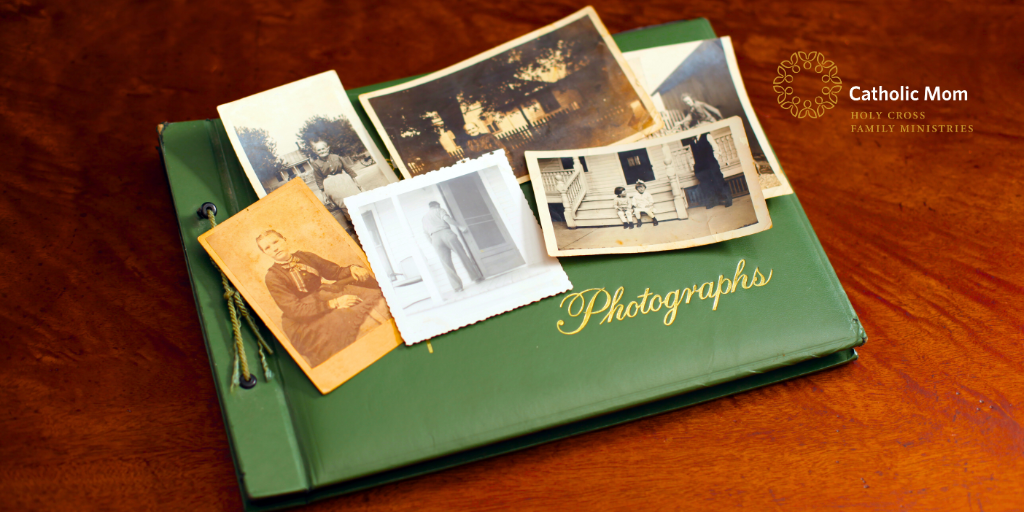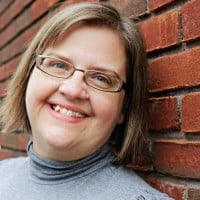
Amanda Woodiel reflects on the sacred responsibility of holding one another’s memories, recalling how she cared for two people suffering from memory loss.
In a seminar class today at Notre Dame, where I am a grad student in the Masters of Divinity program, we discussed the importance of memory through examining a case study. The young woman leading the discussion sought me out ahead of time to warn me about the topic, since she knew that I had spent seven years caring for my mother who was afflicted with dementia. One of the fundamental questions we examined was how to accompany someone whose memory is fading.
Ironically, scarcely an hour later, my son’s school called me to inform me that my son had hit his head hard on the pavement. While with my husband at the emergency room getting a CT scan, he could not remember his brother’s middle name, where he goes to school, or the year he was born. This is scary, admittedly. I believe this temporary memory loss to be common among concussion cases, but it brings me to reflect again on the theme of the day: memory.
What is this faculty of the soul called memory? Saint John of the Cross called it the faculty of self-possession. What happens, then, when we can’t possess ourselves through our memory?
This is, obviously, a personal question for me, and one I reflect on more than the average person as I wonder what future my capacity for memory will be.
I Love You Because You Are
The first large lesson I learned from caring for my beloved mother was this: Losing one’s memory, while it may influence that person’s personality characteristics, does not impact the person’s dignity or worthiness of love. When I was in high school, I would have told you that I loved my mother because she was vivacious, creative, and fun. Dementia altered these attributes one by one until I had to say that I loved my mother because she was.
In the end, this is a purer form of love — one that is not contingent on what pleasure or delight the person brings to the table. It is also closer to the divine aspect of love: God loves us because He loves. In fact, the very reality of our being is proof of His love. Without His love, we would not exist. He loves us because He loves and He loves us because we are and we are because He loves us.
When we cannot remember who we are, when we cannot carry the faculty of self-possession, it is up to the community to carry that identity for another. Whether the memory loss is permanent or temporary, we as a community hold another person’s story, past, and relationships with a sacred responsibility. You may not know who you are, we may say to the other, but I know you. My mother delighted in hearing stories about herself that she didn’t remember.

The Difficulty of Accompanying Someone with Memory Loss
My experience in accompanying someone with dementia is that one of the most frustrating parts is what it points out about your own lack of virtue. It is easy to think of yourself as a patient person until your patience is tried through answering the same question seven times in a row, seven days in a row, seven weeks in a row. It is easy to think of yourself as a joyful person until confronted with someone’s irrational anxiety or anger again and again.
It is difficult but crucial to remember that this person is not culpable for the difficulty he causes and often hardly knows that he is being difficult. Being sick is a certain type of cross; being a caregiver can be too. It is only through the Cross, though, that the Resurrection comes.

My son came home. He does indeed have a concussion, but his memory is starting to come back. After twenty minutes of groggy silence, he suddenly said, “It’s Thomas.”
I smiled. “Yes, it is. Your brother’s middle name is Thomas.” Perhaps one day he will return the favor and hold my memory for me.
Share your thoughts with the Catholic Mom community! You'll find the comment box below the author's bio and list of recommended articles.
Copyright 2025 Amanda Woodiel
Images: Canva
About the Author

Amanda Woodiel
Amanda Woodiel is a Catholic convert, a mother to five children ages 14 to 6, a slipshod housekeeper, an enamored wife, and a “good enough” homeschooler who believes that the circumstances of life—both good and bad—are pregnant with grace. Her oldest son was diagnosed with cancer in the summer of 2022, which is providing plenty of opportunities to test that hypothesis.


.png?width=1806&height=731&name=CatholicMom_hcfm_logo1_pos_871c_2728c%20(002).png)
Comments